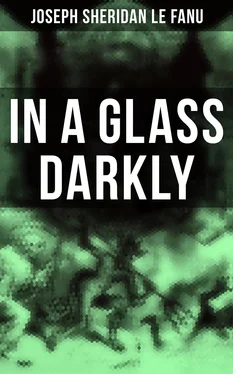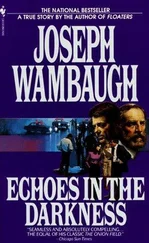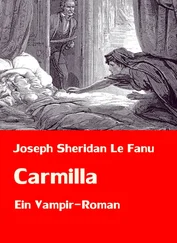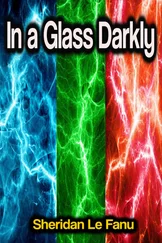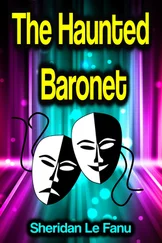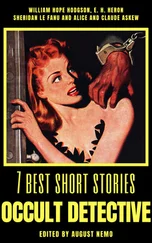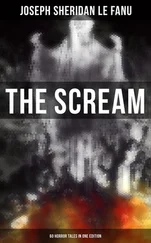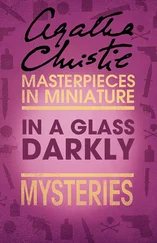“So he is, and, better still, he is a really good man,” said she. “His advice is invaluable about my schools, and all my little undertakings at Dawlbridge, and he’s so painstaking, he takes so much trouble — you have no idea — wherever he thinks he can be of use: he’s so good-natured and so sensible.”
“It is pleasant to hear so good an account of his neighbourly virtues. I can only testify to his being an agreeable and gentle companion, and in addition to what you have told me, I think I can tell you two or three things about him,” said I.
“Really!”
“Yes, to begin with, he’s unmarried.”
“Yes, that’s right —-go on.”
“He has been writing, that is he was, but for two or three years perhaps, he has not gone on with his work, and the book was upon some rather abstract subject — perhaps theology.”
“Well, he was writing a book, as you say; I’m not quite sure what it was about, but only that it was nothing that I cared for; very likely you are right, and he certainly did stop — yes.”
“And although he only drank a little coffee here to-night, he likes tea, at least, did like it extravagantly.”
“Yes, that’s quite true.”
“He drank green tea, a good deal, didn’t he?” I pursued.
“Well, that’s very odd! Green tea was a subject on which we used almost to quarrel.”
“But he has quite given that up,” said I. “So he has.”
“And, now, one more fact. His mother or his father, did you know them?”
“Yes, both; his father is only ten years dead, and their place is near Dawlbridge. We knew them very well,” she answered.
“Well, either his mother or his father — I should rather think his father, saw a ghost,” said I.
“Well, you really are a conjurer, Dr. Hesselius.”
“Conjurer or no, haven’t I said right?” I answered merrily.
“You certainly have, and it was his father: he was a silent, whimsical man, and he used to bore my father about his dreams, and at last he told him a story about a ghost he had seen and talked with, and a very odd story it was. I remember it particularly, because I was so afraid of him. This story was long before he died — when I was quite a child — and his ways were so silent and moping, and he used to drop in sometimes, in the dusk, when I was alone in the drawing-room, and I used to fancy there were ghosts about him.”
I smiled and nodded.
“And now, having established my character as a conjurer, I think I must say good-night!” said I.
“But how did you find it out?”
“By the planets, of course, as the gypsies do,” I answered, and so, gaily we said good-night.
Next morning I sent the little book he had been inquiring after, and a note to Mr. Jennings, and on returning late that evening, I found that he had called at my lodgings, and left his card. He asked whether I was at home, and asked at what hour he would be most likely to find me.
Does he intend opening his case, and consulting me “professionally,” as they say? I hope so. I have already conceived a theory about him. It is supported by Lady Mary’s answers to my parting questions. I should like much to ascertain from his own lips. But what can I do consistently with good breeding to invite a confession? Nothing. I rather think he meditates one. At all events, my dear Van L., I shan’t make myself difficult of access; I mean to return his visit tomorrow. It will be only civil in return for his politeness, to ask to see him. Perhaps something may come of it. Whether much, little, or nothing, my dear Van L., you shall hear.
Chapter III.
Dr. Hesselius Picks Up Something in Latin Books
Table of Contents
Well, I have called at Blank Street.
On inquiring at the door, the servant told me that Mr. Jennings was engaged very particularly with a gentleman, a clergyman from Kenlis, his parish in the country. Intending to reserve my privilege, and to call again, I merely intimated that I should try another time, and had turned to go, when the servant begged my pardon, and asked me, looking at me a little more attentively than well-bred persons of his order usually do, whether I was Dr. Hesselius; and, on learning that I was, he said, “Perhaps then, sir, you would allow me to mention it to Mr. Jennings, for I am sure he wishes to see you.”
The servant returned in a moment, with a message from Mr. Jennings, asking me to go into his study, which was in effect his back drawing-room, promising to be with me in a very few minutes.
This was really a study — almost a library. The room was lofty, with two tall slender windows, and rich dark curtains. It was much larger than I had expected, and stored with books on every side, from the floor to the ceiling. The upper carpet — for to my tread it felt that there were two or three — was a Turkey carpet. My steps fell noiselessly. The bookcases standing out, placed the windows, particularly narrow ones, in deep recesses. The effect of the room was, although extremely comfortable, and even luxurious, decidedly gloomy, and aided by the silence, almost oppressive. Perhaps, however, I ought to have allowed something for association. My mind had connected peculiar ideas with Mr. Jennings. I stepped into this perfectly silent room, of a very silent house, with a peculiar foreboding; and its darkness, and solemn clothing of books, for except where two narrow looking-glasses were set in the wall, they were everywhere, helped this sombre feeling.
While awaiting Mr. Jennings’ arrival, I amused myself by looking into some of the books with which his shelves were laden. Not among these, but immediately under them, with their backs up ward, on the floor, I lighted upon a complete set of Swedenborg’s “Arcana Cælestia,” in the original Latin, a very fine folio set, bound in the natty livery which theology affects, pure vellum, namely, gold letters, and carmine edges. There were paper markers in several of these volumes, I raised and placed them, one after the other, upon the table, and opening where these papers were placed, I read in the solemn Latin phraseology, a series of sentences indicated by a penciled line at the margin. Of these I copy here a few, translating them into English.
“When man’s interior sight is opened, which is that of his spirit, then there appear the things of another life, which cannot possibly be made visible to the bodily sight.” . . . .
“By the internal sight it has been granted me to see the things that are in the other life, more clearly than I see those that are in the world. From these considerations, it is evident that external vision exists from interior vision, and this from a vision still more interior, and so on.” . . . .
“There are with every man at least two evil spirits.” . . . .
“With wicked genii there is also a fluent speech, but harsh and grating. There is also among them a speech which is not fluent, wherein the dissent of the thoughts is perceived as something secretly creeping along within it.”
“The evil spirits associated with man are, indeed from the hells, but when with man they are not then in hell, but are taken out thence. The place where they then are, is in the midst between heaven and hell, and is called the world of spirits — when the evil spirits who are with man, are in that world, they are not in any infernal torment, but in every thought and affection of man, and so, in all that the man himself enjoys. But when they are remitted into their hell, they return to their former state.” . . . .
“If evil spirits could perceive that they were associated with man, and yet that they were spirits separate from him, and if they could flow in into the things of his body, they would attempt by a thousand means to destroy him; for they hate man with a deadly hatred.” . . . .
Читать дальше
